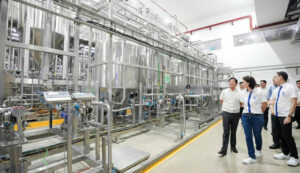By Justine Irish D. Tabile, Reporter
MANUFACTURERS could contribute more to the economy if the business environment were more friendly to new companies, the head of a distilling company said.
In a panel discussion at the BusinessWorld Economic Forum on Wednesday, Destileria Limtuaco & Co., Inc. President Olivia Limpe-Aw said manufacturing companies have to deal with many government agencies just to start their businesses.
“There’s really a lot of potential for manufacturing to grow in the Philippines. I think we just need to make it easier for would-be entrepreneurs and existing entrepreneurs to expand,” Ms. Limpe-Aw said.
“There’s already a lot of risk (in manufacturing) so if we make it more conducive and simpler for businesses, I think there’s no reason why we can’t be bigger than what we are doing now,” she added.
Manufacturing accounted for 19.9% of gross domestic product, compared with the 61.1% share of the service sector in the first quarter, the Philippine Statistics Authority said.
“Definitely, 20% is really not good for us. We should really grow that number and be bigger than that given our domestic market and our potential export market,” she said.
“That is why our Department of Trade and Industry has to really streamline and work with other agencies to provide trade facilitation,” she added.
Philippine Economic Zone Authority (PEZA) Deputy Director for Finance and Administration Maria Veronica F. Magsino said that the investment promotion agency believes that manufacturing shows potential for significant growth despite the challenges.
“We at PEZA believe that we have strong pull factors in the country that enable us to attract investments, and because of our huge market potential and favorable business regulations, the Philippines remains an attractive base for offshore activities,” Ms. Magsino said.
She said that recent surveys showed that the Philippines remains an attractive manufacturing hub, particularly for exporting products to Japan.
The surveys, she said, cited the country’s low cost of labor, growing domestic market, tax incentives, and regulatory support as among its advantages.
Asked what sectors they think should be prioritized, Ms. Magsino said that PEZA is currently following the National Government’s investment priorities plan.
“But inside the economic zones, we also push for high-value investments such as the automotive industry … We also put priority in the pharmaceutical, medical and healthcare services, and renewable energy sectors,” she added.
Ms. Limpe-Aw said that the Philippines should focus on investments that will develop the materials it is rich in.
“I think generally, it would be advisable to use what you already have. If we have a lot of a certain type of raw material, it would be better to manufacture and process it here and sell it here, or if you still have extra, sell it to other markets,” she said.
She said that due to shipping delays and geopolitical issues, the Philippines can no longer depend on imports.
